A Miracle in the History of Cardiac Surgery
2020-09-27TextbyLiuXunWangJiliangNieWenwenLiuKunwei
Text by Liu Xun, Wang Jiliang, Nie Wenwen & Liu Kunwei
Edited by He Sai & Yi Wanru
Photos by Wang Yongsheng
“I never expected that I could have the chance to come back,” said Lingling(pseudonym), a girl from Weihai, Shangdong Province,who was lying in an ICU of the Union Hospital affiliated to Tongji Medical College of HUST(Huazhong University of Science and Technology), in Wuhan.Recalling her thrilling experience on her way back from Japan, she felt sheer luck and some lingering fear.
Two years ago, Lingling started her internship at an electronics manufacturing enterprise in Aichi-ken, Japan. There the medicine she took to treat her acne caused a severe drug allergy that damaged her renal and myocardial function. Last May,her illness worsened rapidly,causing her blood circulation system to lose function. As a result, her life was in great danger. Lingling was then transferred to Fujita Health University Hospital in Nagoya for treatment. The experts from the hospital confirmed that Lingling was suffering from giant cell myocarditis, which meant that she was nearly undergoing cardiac failure, and cardiac arrest could occur at any time.
Last September, Professor Yoshiyuki Takami performed the surgery for Lingling, installing two extracorporeal artificial hearts to help pump blood.Seeing Lingling’s heart connected with so many pipes, her mother was extremely sad. Worse still,Lingling’s cardiac function remained unimproved even after the operation, and her cardiac muscle was still undergoing extensive fibrosis. Owing to the relevant policies and regulations in Japan, Lingling had to receive a heart transplant back in China.
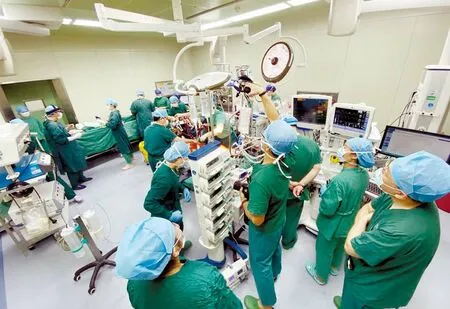
After waiting for nearly ten months, Lingling finally has her heart transplant on June,25, the Dragon Boat Festival端午节(6月25日),玲玲完成等待了近10个月的心脏移植手术
“我没想到自己还有机会回来。”年轻的山东威海女孩玲玲(化名)躺在武汉华中科技大学同济医学院附属协和医院的ICU病房里,回想自己一路惊心动魄的抢救经历,感到万分幸运,又有些心有余悸。
两年前玲玲以实习生身份,前往日本爱知县一家电子设备制造企业工作。因服用了治疗粉刺的药导致严重药物过敏,引发肾功能、心肌功能损伤。去年5月,病情一度急转直下:血液循环系统功能接近丧失,生命告危。玲玲被转入名古屋藤田医科大学医院治疗。医院组建专家组,确诊玲玲是“巨细胞性心肌炎”,这意味着她心脏几近衰竭,随时会骤停。
去年9月,该院心脏血管外科教授高味良行主刀,为玲玲加装了2台体外“人工心脏”,协助心脏泵血。看着女儿的心脏连接了这么多管子,身边的母亲非常难过,更难过的是,都装了两台人工心脏了,玲玲的心脏功能还是没有任何恢复的迹象,且心肌广泛纤维化。而受限于日方相关政策条件,玲玲只能回国接受心脏移植手术。
Seeing Lingling in such severe condition, her parents were on pins and needles. After learning that the Department of Cardiac Surgery of Wuhan Union Hospital was among the top ones in the field, her father turned to Professor Dong Nianguo for help this January. Professor Dong,head of the Department of Cardiac Great Vascular Surgery of the hospital, immediately started conversations with the Japanese experts and decided that Lingling should be taken back home in late January. However, the plan was stopped unexpectedly by the COVID-19 epidemic. Lingling had to cancel her flight and stay in Japan to receive her maintenance treatment.

Lingling sitting in the first row on the flight 玲玲坐在航班第一排
Infection, bleeding, and cerebral infarction occurred in succession afterwards— Lingling’s life was in great risk. Artificial hearts have a limited service life,“We really cannot afford to delay the heart transplant any longer,”Professor Dong intensified his communication with the Japanese counterparts. Meanwhile, the relevant departments of the two countries were also making efforts jointly. This would be a transnational relay and most importantly, the artificial hearts would have to have a continuous power supply during the journey back to China. What’s more, the two artificial hearts were of such a big size, how could they be taken on board the plane together with the patient? With the small passenger cabin, how should they transport the equipment and the patient together? Furthermore, in case of emergency, how could they carry out salvage work? All these problems had to be taken into account carefully in advance and an alternative plan would have to be made. The two hospitals were facing an unprecedented challenge.
The final solution was that Lingling would sit in the first row with the two artificial hearts on the seats next to her. To make more space for salvage, the seatbacks of the first three rows would be put down so that the stretcher could be fixed in place.To eliminate any unexpected circumstances, the Union Hospital had prepared two more artificial hearts and two sets of batteries for fear of possible incompatibility with the Japanese apparatus and batteries during electric power conversion. To ensure the supply of oxygen, the airline approved especially of a sufficient quantity of oxygen to be taken aboard. What’s more,the flight also decided on 5 provisional landing sites on the route in case of emergency during the transit.
Approved by the CAAC (Civil Aviation Administration of China), the flight set off from Wuhan Tianhe Airport at 9 am on June 12 and arrived at Nagoya Airport in Japan at noon. After Lingling was put on board, she waved goodbye to the Japanese doctors. 45 minutes later,learning that everything was normal, the Japanese medical workers returned to their hospital. At 6:27 pm, the plane arrived at Tianhe Airport, and Lingling got to the Union Hospital at 8 pm.
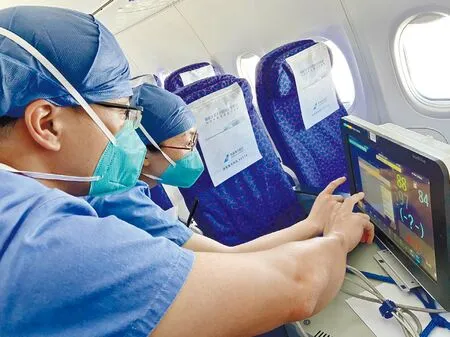
Doctors checking Lingling’s physical condition on the flight 医生在飞机上监测玲玲的身体指标
女儿命悬一线,父母心急如焚。听说武汉协和医院心脏外科很优秀,今年1月,玲玲的父亲找到该院,向心脏大血管外科主任董念国教授求助。董教授马上与日方专家反复沟通,商定1月下旬接玲玲回国手术。没想到突如其来的新冠疫情打乱了计划,原订的航班取消,玲玲只能在日本维持治疗。
感染、出血、脑梗等问题接连出现,玲玲危机重重。人工心脏都有使用期限,“再拖下去可能就没希望了”。董念国加强与日方沟通,同时中日两国相关部门也在共同努力。跨国接力,人工心脏不能断电,两台人工心脏“块头大”,如何连人带机器上飞机?机舱狭小,如何摆放人和机器以及发生意外怎么抢救?一系列问题都要提前考虑并设立预案。双方医院都面临前所未有的难题。
最终定下的方案是:玲玲坐在第一排,两台人工心脏并排放在隔壁座位上。为了腾出抢救空间,乘务员放倒三排座椅靠背,方便担架固定。为了确保万无一失,协和医院又备了两台人工心脏和两套电池,以免电功率转换时日方机器不匹配;为保证供氧,航空公司特批足量氧气上机;担心转运途中随时有突发意外的可能,航班还在沿线暂定了5个备降点。
经民航总局批准,航班于北京时间6月12日9时从武汉天河机场出发,于当日中午到达日本名古屋机场。中日双方工作人员将玲玲安置好后,玲玲与日方工作人员挥手告别。飞行45分钟后,日方医务人员得知玲玲安好才返回医院。18时27分,飞机平稳降落天河机场,20时顺利抵达协和医院。
“It’s a miracle in medical history that the two artificial hearts have been working overload for ten months,” said Professor Dong. Actually, the Japanese experts’ meticulous treatment created favorable conditions for her subsequent heart transplant.
However, the heart transplant was not so easy. There had been two opportunities between June 16 and 19, but Lingling missed them once because of the health problem of the donor heart, and the second time her own physical conditions. Thus they could do nothing but wait patiently for the right heart donor, while the cardiac surgery team treated Lingling carefully.
On June 25, Lingling got a “big present” during the Dragon Boat Festival: the heart of a male donor in Guangzhou matched hers. A“heart-protection delivery” team from the Union Hospital departed for Guangzhou at once, to retrieve the heart within 8 hours.
Every step, from removing the heart from the donor’s body to protecting the heart, to trimming the heart, and finally putting it into Lingling’s chest, was of crucial importance. At 3 pm of that day, the donor heart arrived at the operation room of the Union Hospital. A team of over 20 experts headed by Professor Dong Nianguo and Professor Xia Jiahong got into the operation room at once. At 4 pm, Professor Wu Qingping led his team to proceed with anesthesia for Lingling. According to Professor Wu, it was really challenging.Professor Dong also exclaimed that “the difficulty of the surgery was by far greater than they had expected,” because the pipelines of the artificial hearts were so complicated that it made the thoracic tissues fragile with severe adhesions.
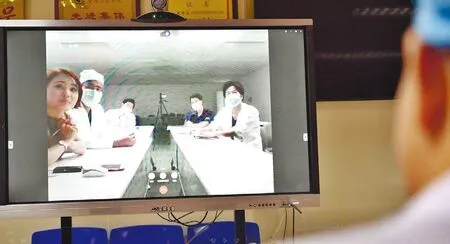
Chinese and Japanese doctors discussing Lingling’s treatment plans online中日专家通过视频讨论玲玲的病情
Surgery under such difficult conditions was unprecedented.After removing the sick heart,Professor Dong trimmed the donor heart and finally managed to put it into Lingling’s chest and then proceeded with vascular anastomosis. After 7 hours of intense surgery, the healthy heart started to beat again in Lingling’s body—the surgery was a complete success. The long-lost smiles appeared on the faces of Lingling’s anxious parents waiting outside the operation room.
On the day of the operation,the Japanese experts viewed the whole process of the surgery through video. Seeing the success of the operation, Professor Yoshiyuki Takami felt relieved.He said he was pleased to see the relay across the two countries produce good result and he also admired the expertise and professional dedication of the Chinese doctors.
The next day after the operation, Lingling began to take breathing exercises; on the third day, the trachea cannula was removed; on the fifth day,Lingling was able to eat by herself;by July 2, everything was normal with Lingling’s circulation system and breathing, and she was able to eat normally and exercise at the bedside on her own. According to Professor Dong, Lingling still needed to face challenges such as infection and rejection before a full recovery.
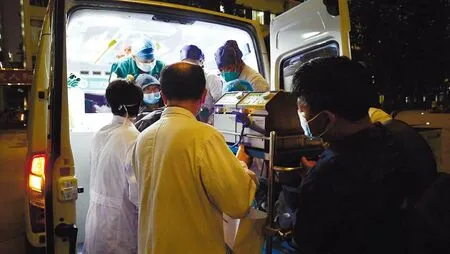
After leaving the cabin, Lingling and her artificial hearts are carried to the ambulance together出机舱后,玲玲和人工心脏一起被抬上救护车
“从一台到两台人工心脏,超负荷运转10个月,这在医学史上已经是奇迹。”董念国教授说,日本专家前期的精心救治,为玲玲后续的心脏移植创造了条件。
然而,供心的事又一波三折,16日至19日有两次供心机会,先后因为心源本身和玲玲的自身身体状况遗憾错失。等待心脏供体期间,心外科团队精心守护玲玲,静待供心再次出现。
6月25日,玲玲收到了她的端午“大礼”:一颗位于广州的男性供心。心外科“护心跑男”团队立即出发去广州取供心。他们必须在8小时之内把供心取回来。
从取心到护心,再到心脏修剪,最后放入胸腔,每一步都至关重要。当天15时,心源抵达协和医院手术室,董念国教授、夏家红教授带领20余名专家团队进入手术状态。16时,武庆平教授带队实施麻醉。他说,这次挑战前所未有。董念国也感慨“难度远超预期”:人工心脏管道在体内走向错综复杂,导致胸腔组织脆弱、粘连严重。
在这种条件下进行心脏移植手术,世界罕见,难度极高。在切除病变心脏后,董教授修剪心脏,最终成功置入并小心进行血管吻合。经过7个小时的紧张手术后,一颗强劲而有力的心脏在玲玲体内重新跳动,手术圆满成功。手术室外焦急等待的玲玲父母,终于露出了久违的笑容。
手术当天,日方专家通过视频观摩了这场高难度手术。高味良行教授看到手术成功后,松了一口气。他说,很高兴看到中日携手的生命接力结出硕果,敬佩中方医生的专业技术与敬业精神。
术后第二天,玲玲开始锻炼呼吸;第三天,成功拔出气管插管;第五天,恢复自主进食;至7月2日,玲玲循环、呼吸稳定,能够正常进食,并在床边自行活动。董念国说,后续她还有抗感染、抗排斥等关卡要闯。
“这个女孩有着顽强的生命力,无论多难,脸上都挂着温暖的微笑,令人感动。”参与救治玲玲的协和医院医生李平说。女儿重生,玲玲父母百感交集。
“生命所托,即使再难,医生不能轻易说放弃。”董念国教授感慨,此次跨越国界生命接力的成功,是中日两国民众患难与共、用爱守护生命的又一生动写照。
“What moves us most is the girl’s strong vitality. However hard it was for her, she always smiled,” said Li Ping, a doctor assisting the surgery. Lingling’s parents also hold mixed feelings witnessing the rebirth of their daughter.
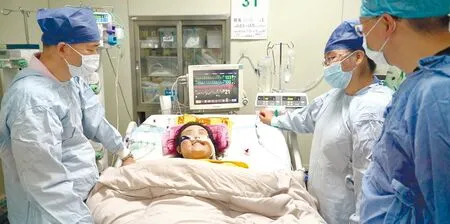
Lingling recovers well after the operation 玲玲接受手术后恢复良好
To Professor Dong, it is “the entrustment of the patient’s life on them, no matter how hard it is”—as doctors, “they would never give up saving a life.” The success of the transnational relay is another reflection of the Chinese and Japanese people sharing weal and woe together and saving life with love.
